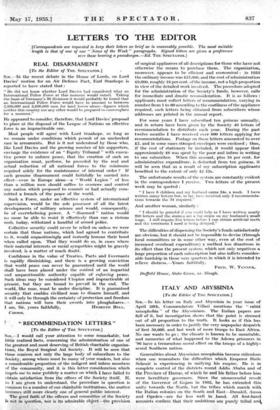LETTERS TO THE EDITOR
[Correspondents are requested to keep their letters as brief as is reasonably possible. The most suitable length is that of one of our " News of the Week" paragraphs. Signed letters are given a preference over those bearing a pseudonym.—Ed. TUE SPECTATOR.]
REAL DISARMAMENT
[To the Editor of THE SPECTATOR.]
Sin,—In the recent debate in the House of Lords, on Lord Davies' motion for an Air Defence Pact, Earl Stanhope is reported to have stated that :
"He did not know whether Lord Davies had considered what an International Police Force at this Moment would entail. Taking the basis of Germany's 30 divisions it would probably be found that an International Police Force would have to amount to between 2,000,000 and 3,000,000 men for land forces-alone--figures which neither this country nor any other would be prepared to contemplate for a moment."
He appeared to. consider, therefore, that Lord Davies' proposal to place at the disposal of the League of Nations an effective force is an impracticable one.
Most people will agree with Lord Stanhope, so long as we remain under conditions which permit of an unchecked race in armaments. But is it not understood by those who, like Lord Davies and the growing number of his supporters, envisage the existence of an " Equity Tribunal " with execu- tive power to enforce peace, that the creation of such an organization must, perforce, be preceded by the real and actual reduction of all national forces to the minimtun required solely for the maintenance of internal order ? If such genuine disarmament could faithfully be carried into effect—even in Europe alone—a " World Legion " of less than a million men should suffice to overawe_ and control any nation which proposed to commit or had actually com- mitted a breach of the peace of the world.
Such a Force, under an effective system of international supervision, would be the sole possessor of all the latest developments of military science and would, consequently,
be of overwhelming power. A " disarmed " nation would no more be able to resist it effectively than can a riotous mob, today, withstand a handful of armed police.
Collective security could never be relied on unless we were certain that those nations, which had agreed to contribute to it, would unquestioningly and instantly honour their bond when called upon. That they would do so, in cases where their material interests or racial sympathies might be gravely involved, is a matter of much doubt.
Confidence in the value of Treaties, Pacts and Covenants is rapidly diminishing, and there is a growing conviction that world peace can never be guaranteed until the world shall have been placed under the control of an impartial and unquestionable authority capable of enforcing peace. Such ideas may be considered Utopian and impracticable at present, but they are bound to prevail in the end. The world, rike man, must be under discipline. It is guaranteed security that enables civilized man to disarm himself, and it will only be through the certainty of protection and freedom that nations will turn their swords into ploughshares.—










































 Previous page
Previous page